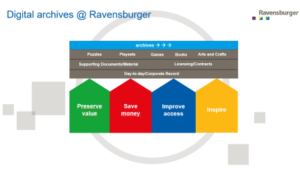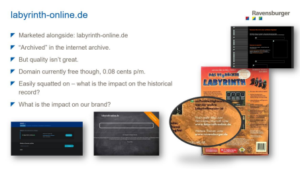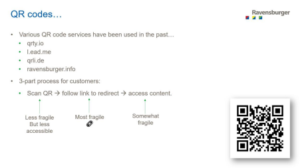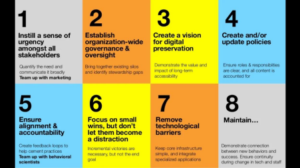By Ross Spencer, Digital Preservation Specialist, Ravensburger AG.
An Introduction
I met Julie Allen, Executive Director of the Open Preservation Foundation (OPF), a few months ago. It was an opportunity for me to share some of my favourite aspects of OPF and what they have meant to me throughout my career, in digital preservation.
It was Peter May, OPF Board member, who prompted the chat, partially reflecting on my past roles in government archives, and also in a vendor capacity as a software developer. What’s changed in the last 18 months, however, is my joining the corporate archive at Ravensburger AG as their sole Digital Preservation Specialist.
Julie suggested I write a little more about this, and also that there may be an opportunity for OPF and our colleagues to help in this growing field.
Introducing: The Ravensburger Group
Ravensburger AG is an international group that includes several renowned global toy brands, including Ravensburger, BRIO and Thinkfun. The group also incorporates a number of different subsidiaries.
The Ravensburger blue triangle is one of the leading European brands for games, puzzles and arts & crafts, as well as for German language youth and children’s books. International brand BRIO produces innovative wooden play worlds and ThinkFun produces brain and logic games.
For more information about Ravensburger, please visit our news item on the OPF website or the Ravensburger Group website itself.
Part of the present day role of the corporate archive is to bring together, and make available, the respective histories and perspectives of our different brands, as well as to provide different archival services to the organisation. I work alongside the Corporate Archivist to provide these services.
But what does that look like? What exactly does a corporate entity need from an archive?
The Corporate Archive Service
Firstly, we can see there are broad responsibilities for the corporate archive.

The diagram above shows a number of different categories, archival functions and record types, and the benefits of maintaining an archive.
Categories: Puzzles, playsets, games, books, arts and crafts.
Record types: Supporting documents and material; licensing and contracts; the day-to-day corporate record.
Benefits: Preserve value, save money, improve access, and inspire.
We have products dating back to 1883, all very haptic. Today we have everything from painting-by-numbers and jigsaws, to augmented reality products, such as the company’s recent release, Echoes. The range of what we need to preserve is highlighted by keeping a librarian’s hat on, with books being published via Ravensburger Verlag and by other imprints previously. The books also take on a digital aspect in today’s world, with digital incorporated into products, such as tiptoi® (OCR and digital audio playback) and a more recent release: SAMi – dein Lesebär!
I have also enjoyed looking for digital in more obscure places, such as website listings, QR codes and app store links, in different packaging material.

Excerpt from a recent presentation to the company, asking colleagues to look at digital through different lenses. Even though the packaging of a computer game is physical in form, we display hyperlinks for customers to visit – these are digital and invoke the disciplines of web-archiving when used. Today, the domain, circa 2001, is only available on the Internet Archive, and the original domain-name is up for sale.

Excerpt from a recent presentation to the company, looking at the fragility of QR codes on corporate packaging, especially codes that use a third party service or redirect.
With my arrival at the corporate archive, we hope to get to grips with the digital aspects of our work. Within the last 18 months, we have worked hard to develop a mission and vision for the archive. We’ve conducted an initial survey of digital preservation systems and piloted one of the primary offerings, to understand how it can help further our mission. We have been active members of the Wikibase Stakeholder Group and are trialling Wikibase as a linked open data platform for enhanced archival description. I am currently working on a more general digital preservation strategy, and we also have an apprentice in the archives office currently looking at the benefits of NESTOR, or similar certification in the corporate environment. We’ve also seen an uptick in interest in the archive with the extra capacity to manage a Microsoft Teams group for outreach across different company boundaries.
Why a Corporate Archive
Touched upon above, a corporate archive has a number of benefits. There’s a close parallel to digital preservation.
When I first interviewed for the role, I sought out the advice of my colleagues in the field, to find a concise definition of the benefits of digital digital preservation for an organisation. Jan Hutař, at Archives New Zealand, reminded me of a project that he was part of, that started in 2006; Digital Preservation Europe.
Their summary, for me, hits the nail on the head, describing the following:
- Legal.
National legal frameworks often require organisations to provide adequate records of business processes, communications and many other types of data for many years after their creation.
- Accountability & protection from litigation
Recent legal cases have shown the importance of being able to search and recover archived emails quickly and in a legally admissible manner.
- Protecting the long term view
Access to digital data is critical to ensure business continuity and to support decision making with a long term view. For research in particular, preserving data may be crucial for identifying long-term trends.
- Protecting investment
The valuable intellectual assets of organisations are increasingly in digital form.
This data represents both intellectual property and a considerable investment of time, effort and money. It would therefore be foolish not to protect and preserve these assets adequately.
- Reuse
Repositories of digital information and the tools to mine, analyse and re-purpose them represent a society’s intellectual capital. Effective and affordable digital preservation solutions are essential to transfer digital data into valuable assets for business.
Within the Ravensburger group, this may translate along the lines of:
- Satisfy legislative requirements worldwide (legal).
- Ensure the ability to retrieve material quickly and in a legally admissible manner as required (accountability and protection from litigation).
- Ensure business continuity and to support long-term decision-making, for example, identifying trends in different archival and preserved “datasets“ (protect the long-term view).
- The organisation’s assets will be increasingly born-digital and represent an amount of time, effort, ingenuity, and other investment to make it real. (protect investment)
- Correctly managed digital offers the opportunity to dissect, to analyse, to repurpose, evolve, and turn into other valuable business assets (reuse).
Combined with a strategic direction, to make digital a core competence within Ravensburger, now is the ideal time to initiate an archival programme with digital preservation at its core, that looks at our holdings as data that provide insight and inspiration to the different teams within the company.
What have I learned?
Corporate archives are a fascinating topic. In Germany at least, there isn’t a legal requirement to maintain a corporate archive, and the duties of the corporate archive can vary wildly within the bounds of what is possible.
Legally, archives are important resources to keep coming back to. For example, we may need to prove our product quality and how it was produced and distributed; counterfeits are an important topic for maintaining revenue. The legal part of our work extends to helping look after contracts, which in a lot of cases extend beyond the life of a creator (artist, illustrator, author). And these come with increasing digital challenges, including digital signing in its variousforms. (See this issue on PDFCPU). Incidentally, I don’t believe digitally signed PDFs are something JHOVE can flag yet, however I have not been in a forum for a while in which to raise this.
Beyond the legal side, there’s a focus in the group on real-time work, making sure digital services and resources are available today and for a short period of time in the future, so that we do not lose time getting products to market or to shelves. This includes discussions on operational IT vs. long-term preservation and availability.
Like many colleagues in the field, I find myself arriving in an organisation that isn’t necessarily prepared for digital archiving or preservation. Yet, many of the requirements of this role can be categorised into two things;
- Integration into IT infrastructure (storage, business systems, information security, systems development etc) which means you start to look like you’re treading on operational IT toes where you don’t work within the IT department,
- and a willingness for the rest of the organisation to work alongside you to develop policies and procedures that can see front-of-office digital records appraised and transferred to the archive.
Both of these start to fall into organisational alignment as described by AV Preserve, and it can be very difficult when you sit comparatively low in an organisation’s hierarchy.

Slide taken from Kara van Malssen’s presentation on organisational alignment.
Where is help coming from?
In Germany we have the excellent “Arbeitskreis Elektronische Archivierung” (AKEA) in the “Vereinigung der Wirtschaftsarchivarinnen und Wirtschaftsarchivare e.V.” (VdW) (“Working Group Electronic Archiving” (AKEA) in the “Association of Business Archivists e.V.” (VdW) led by Dr. Ulrike Gutzmann of the Volkswagen Group.
The group has a lot of support in the corporate archive sector in Germany. It is a German language group, and so difficult for me to participate in, but is still something that will be attended by our Corporate Archivist. I am sure we will learn a lot from colleagues here, who are currently looking at the challenges of web archiving, and making use of systems such as Fedora or Landesarchiv Baden-Württemberg’s DIMAG system.
I believe there may still be room for a broader approach.
How can the OPF help?
The OPF is an incredible community with some of the world’s leading institutions. Lots of National organisations and in a corporate capacity, often providers of digital preservation systems such as ExLibris and Preservica. I will always be drawn to the “Open” in Open Preservation Foundation too.
Ravensburger AG became a member of the OPF back in July this year (2022). Hopefully we’ll continue to be members for years to come.
For us, our membership is recognition of the work that the OPF does, how international they are, their collegiality, how they connect to communities, and the tools and resources they make available to us all.
One of the communities we hope that they can help us to connect with is the corporate archive community outside of Germany, and perhaps, understand how we can approach the problem from an international perspective. We’d love to learn from legislation in other countries and how companies work with that. We’d also like to hear more about the different initiatives implemented at different organisations.
From a technology perspective, we’d love to share and hear more about front-office systems for:
- Customer relationship management,
- Content management,
- Email, and office productivity,
- Social media management and engagement,
Also, how data is collected, appraised, and then preserved digitally. What does an archival description system look like in a corporate archive?
We’d also like to learn more about how you engage with your colleagues in a corporate entity. We have a staff of two, within an organisation of more than two-thousand people, and unlike a government archive, where many are sold on the mission and direction, there’s a lot of foundation building, in our corporate archive at least.
We’d love to hear more about how you are selling the advantages of digital preservation, providing access, and the value added aspects of your work. How you are taking records of yesterday and pluralising those today for commercial (or heritage) endeavours and the challenges associated with that too; licensing and rights management, data protection, and so on. I am sure there will be a lot more to learn as well!
But wait, how can OPF help?
Does this sound like it could be a working group? Does it sound like something you might be interested in? We hope so! We hope there are more of you in the corporate sector that are also wrestling with how to optimise your efforts and learn from others. And we hope that you’re willing to share too!
So, please, if you are interested, perhaps put your hand up to this post and let us know. If you’re reading this and you’re not a member of OPF yet, read more here and get that application in today! But also, that doesn’t preclude inclusion. You can sign up to the OPF blog to leave your comments, and you can email [email protected] to let us know if you can participate. Together we’ll coordinate with the OPF to set up an initial discussion, and then we can see where we go from there!
Ross Spencer, Digital Preservation Specialist, Ravensburger AG.


